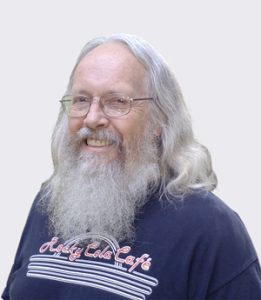CV’s First Inhabitants – The Harvest Festival
The Tongva Native Americans had many celebrations throughout the year: summer and winter solstice, rites of puberty, harvests, funerals and political advancements all merited feasts, songs and dances. The following is a fictionalized account of a harvest festival one fall day in the village of Wiqangna, in what is today the Crescenta Valley.

president of the Historical Society
of the Crescenta Valley and loves local history. Reach him at
lawlerdad@yahoo.com.
The villagers of Wiqangna had worked hard during the summer gathering food. Each day they had left their village on the little rise at the west end of the valley (today’s Verdugo Hills Golf Course), and spread out across the slanted valley (Crescenta Valley) to gather seeds and roots. Their recent rabbit drive had been successful, and the heat of the summer had driven deer within easy hunting range. They had just finished their acorn harvest in the big oak forest along the creek at the base of the hills (a remnant of that forest is CV Park). It was time to celebrate.
Wiqangna’s tomyaar (chief) had last year married the daughter of the tomyaar from the neighboring village of Tujungna, so that village was invited to the celebration. About 40 of the Tujungna villagers, wearing their finest, had crossed the stream (Big Tujunga Creek) and walked the rocky trail leading up through the small valley (Foothill Boulevard through Sunland/Tujunga). They crested the rise (near In-N-Out Burger) and headed downhill on the trail that followed the stream (Tujunga Canyon Boulevard).
After the Tujungna villagers crossed the little creek (Verdugo Creek), they formed into a procession to enter Wiqangna. Their shaman (medicine man) went on ahead and joined Wiqangna’s shaman. Together they played a beautiful song on their deer-bone whistles as the colorful group approached the village. All the Wiqangna villagers gathered on either side of the possession; the Tujungna group broke into song. They danced as they moved between the Wiqangna villagers and laughingly showered them with chia seeds they had brought with them. The visitors from Tujungna carried baskets of food to share and gifts to distribute. It was going to be a great celebration!
The women of Wiqangna paired up with their Tujungna counterparts to begin preparing food for the big feast that evening. The children from Tujungna joined up with the village kids and raced, screaming around the village, while the elders shushed them. The kids formed into a pack and ran down to the creek to splash around. The men greeted each other and exchanged gossip about what was going on in the other villages.
After a couple of hours of talk, one man from Wiqangna, who was known to be the best shot with arrows, challenged the visitors to a contest. The Wiqangna marksman and two men from Tujungna stood facing away from the village. A boy was sent about 50 yards out with a bundle of tule reeds. On a signal, he tossed the bundle high in the air, and the three men shot their arrows at the flying reed bundle. The Wiqangna man hit the bundle repeatedly while the two from Tujungna missed over and over. The two Tujungna men laughingly admitted defeat, and the contest devolved into a merry game for distance shooting, both villages competing happily.
As evening approached, several groups formed to gamble on various dice games. Some of them were guessing games, and the men sang to give themselves more powers of intuition. The feast was ready, so the villages mingled as they ate fresh venison and prickly pear fruit. When they were full, musical instruments were brought out. Whistles and flutes, clacking sticks and rattles made of turtle shells filled with pebbles, and a stringed instrument blended together as many got up to dance.
When it was full dark, a fire was lit and everyone gathered to hear stories from a professional storyteller the Tujungna villagers had brought. A few teenaged couples, bored with the stories, drifted off into the darkness. The tired villagers finally dragged themselves back to their homes, guests in tow. It had been rumored there would be an Eagle Dance at the end of the festival. They slept soundly in preparation for several more days of fun.
